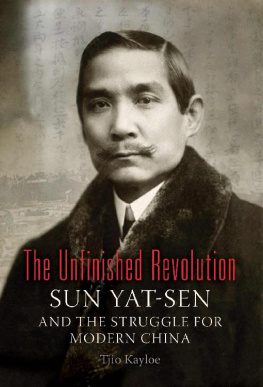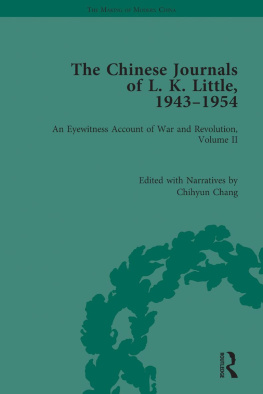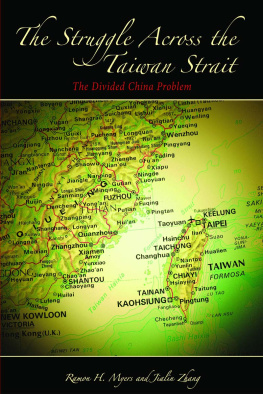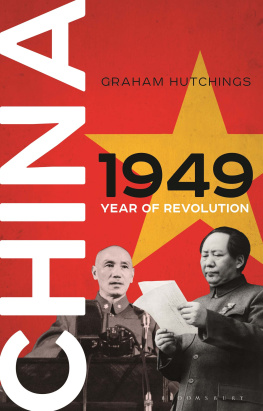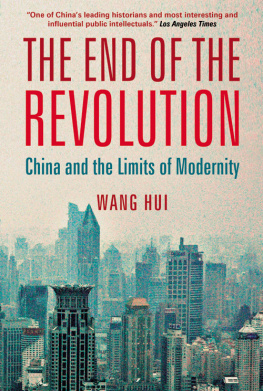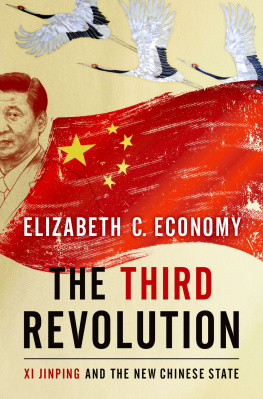Ive read at least 30 or 40 biographies of Sun Yat Sen in my life, so I was intrigued to find out what Kayloe had to say thats new. I was fascinated. He really tells the story afresh. Through a lively series of chapters that capture different phases of Suns life and career, Kayloe tries to understand and to convey to us what made this remarkable man tick. A very readable book... I strongly recommend it.
PROFESSOR WANG GUNGWU,
Founding Chairman, Lee Kuan Yew School of Public Policy,
and University Professor, National University of Singapore
2017 Tjio Kayloe
Published in 2017 by Marshall Cavendish Editions
An imprint of Marshall Cavendish International

All rights reserved
No part of this publication may be reproduced, stored in a retrieval system or transmitted, in any form or by any means, electronic, mechanical, photocopying, recording or otherwise, without the prior permission of the copyright owner. Requests for permission should be addressed to the Publisher, Marshall Cavendish International (Asia) Private Limited, 1 New Industrial Road, Singapore 536196. Tel: (65)6213 9300.
E-mail:
Website: www.marshallcavendish.com/genref
The publisher makes no representation or warranties with respect to the contents of this book, and specifically disclaims any implied warranties or merchantability or fitness for any particular purpose, and shall in no event be liable for any loss of profit or any other commercial damage, including but not limited to special, incidental, consequential, or other damages.
All photographs in this book, unless otherwise specified, are believed to be in the public domain. If you have additional information pertaining to the ownership of the photographs, please contact the publisher so that the relevant credit can be given.
Other Marshall Cavendish Offices:
Marshall Cavendish Corporation. 99 White Plains Road, Tarrytown NY 105919001, USA Marshall Cavendish International (Thailand) Co Ltd. 253 Asoke, 12th Flr, Sukhumvit 21 Road, Klongtoey Nua, Wattana, Bangkok 10110, Thailand Marshall Cavendish (Malaysia) Sdn Bhd, Times Subang, Lot 46, Subang Hi-Tech Industrial Park, Batu Tiga, 40000 Shah Alam, Selangor Darul Ehsan, Malaysia.
Marshall Cavendish is a registered trademark of Times Publishing Limited
National Library Board, Singapore Cataloguing-in-Publication Data
Names: Tjio, Kayloe.
Title: The Unfinished Revolution: Sun Yat-Sen and the Struggle for Modern China / Tjio Kayloe.
Description: Singapore: Marshall Cavendish Editions, 2017. |
Includes bibliography and index.
Identifiers: OCN 992165607 | e-ISBN: 978 981 4779 67 8
Subjects: LCSH: Sun, Yat-sen, 18661925. | PresidentsChinaBiography. | ChinaHistory19121928. | ChinaPolitics and government19121928. Classification: DDC 951.041092dc23
Printed in Singapore by Fabulous Printers Pte Ltd
In memory of my father, Tjio Ie Tjhay,
and my father-in-law, Loureno Lui Hac-Minh,
two of the finest gentlemen from the Old Country,
who did not live long enough to see the modernization of
their fatherland but never wavered in their conviction
that it would happen during my lifetime.
CONTENTS
ILLUSTRATIONS
MAPS
PREFACE
IN OCTOBER 2013, during his state visit to Indonesia, Chinese President Xi Jinping proposed the creation of the Asian Infrastructure Investment Bank (AIIB) to fund infrastructural projects in Asia. He announced the 21st Century Maritime Silk Road initiative in the same speech, which came a month after unveiling the Silk Road Economic Belt initiative during his visit to Central Asia. These pronouncements were greeted with anxiety by the United States, which saw them as part of a Chinese blueprint to expand her economic and geopolitical footprints in the Eurasian landmass and beyond. The U.S. expressed concern that the AIIB might compete with existing institutions, as well as compromise humanitarian and environmental standards in its pursuit of economic development. Nevertheless, 56 countries have joined the Chinese-led bank as of August 1, 2017, with another 24 in the pipeline. In spite of American pressure on her allies to stay out, Japan is the only major country that has not joined.
The AIIB opened for business on January 16, 2016. During its first year of operations, it made loans totaling US$1.7 billion to nine infrastructure projects in partnership with other international financial institutions, including the World Bank. More significantly, the AIIB adopted the best practices of these organizations and has been assigned the highest possible credit ratings by Fitch, Moodys and S&P. Americas fears have not been borne out.
The U.S. has her own reasons for not joining the AIIB, but the implication is quite different when she pressures her allies not to join. Suspicion is a divided highway. Many Chinese see the U.S. reaction as a throwback to the Cold War era, and the attempt to thwart the AIIB as part of a larger conspiracy to contain China and impede her rise. Support for better relations with the United States has been waning among increasing numbers of Chinese and threatens to derail a relationship that for more than 30 years has proved mutually beneficial and contributed to a more secure world.
Relations between China and the U.S. have been marred by mutual suspicion ever since the Communist Party of China assumed power on the Chinese mainland, continuing even after the end of the Cold War and extending up to the present day. A case in point is the incident that took place in Yugoslavia in 1999. On May 8, a U.S. B-2 stealth bomber shelled the Chinese Embassy in Belgrade, killing three Chinese journalists. Most Americans believed it was an accident due to an old map, as claimed by U.S. officials. Contrastingly, virtually every Chinese believed it was deliberate; they found it inconceivable that technologically advanced America could make such a stupid mistake. Angry students took to the streets across China. In Beijing, crowds gathered and hurled insults, rocks and garbage at the U.S. Embassy. Western media assumed that the protests were orchestrated by the Chinese leadership to incite nationalistic fervor and divert attention away from domestic problems. This view became all the more convincing after it was discovered that the Chinese government had been busing student demonstrators to the U.S. Embassy.
The truth was very different. The Chinese authorities did transport the students to the U.S. Embassy, but the motivation was not to exacerbate the protest but rather to contain it. According to an insider, a member of the Politburo, Chinese leaders did not want masses of students marching across the capital vilifying the Chinese leadership for its weak response to the American outrage, and drawing others to join their cause, as happened in the Tiananmen Square incident ten years earlier almost to the month. The leaders wanted to give a measured response, one that was strong enough to placate the students but not so excessive as to hurt relations with the U.S.
Unlike the Soviet Union, which challenged the U.S. for global hegemony, China shows little interest in challenging the U.S., much less dominating the world. China needs many more decades of peace and stability to bring about a moderately prosperous society. There is no ideological conflict between China and the U.S., and while competition may be inevitable, conflict is not. Why then do so many Americans in the government, military and media harbor negative feelings about China? A big part is undoubtedly the realization that China is the only other country with the potential to be both a continental and maritime power. This, coupled with her rapidly growing economic clout, has Americans convinced that it is only a matter of time before China becomes a superpower, and a threat to the U.S. and the existing world order.
Next page
